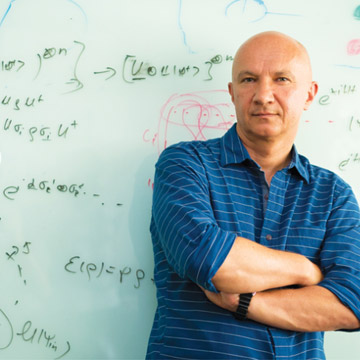Letter from the director
As we all know, it is difficult to make predictions, especially about the future. While our research community has long recognised the commercial potential of quantum technologies, I must admit the worldwide surge of investment, from big corporations, venture capitalists and national governments, took most of us by surprise. It happened sooner and more suddenly than we anticipated. Hype aside, this is both challenging and fascinating. I am confident that quantum technology will have a substantial impact on society in years to come, but its commercial potential in the next five to ten years is anyone’s guess.
CQT was established with a mission to do basic research – and this goes on as usual. We have seen many beautiful research papers coming from CQT. We cannot, however, just wait for commercial things to happen. The time has come for a fruitful discussion among researchers, entrepreneurs, managers, and investors who share an interest in quantum technology, and CQT must play a leading role in such discussions. We want to work closely with industry and government agencies, to point out opportunities but also moderate expectations. This, in fact, we have been doing for some time and now with increasing intensity.
I can recommend CQT’s 2018 Annual Report for a review of our work on both fronts. In the report, you will read that Singapore’s new Quantum Engineering Programme is supporting more translational research, and that several CQT researchers and alumni have ventured outside academia and started their own companies. We have also announced two major new projects that build on the Centre’s long history of expertise in quantum communication, and especially in quantum key distribution. On the domestic side, we will work closely with Singapore’s Infocomm Media Development Authority (IMDA) to promote development of quantum technologies, in particular secure quantum communication, in Singapore. It will include outreach activities, competency development and training for the local industry and government agencies. With an international perspective, the Singapore and UK governments announced an $18 million joint project to build and deploy a satellite quantum key distribution test bed. Reaching into space is a strategic move towards global data security, and we are excited to be part of it.
The CQT annual report will tell you more about our science, outreach and contacts with industry. I hope you will learn more about what we do and how we do things at CQT. I hope you get to know our CQTians a little too. The most valuable part of any research institution is the people. In the corporate lingo, human capital is the ultimate intangible asset. To me, it is more: these friends and colleagues define CQT. I thank all CQTians for their hard work in 2018. Together we are well positioned to meet all the new challenges ahead.

Artur Ekert was CQT's founding Director, leading the Centre from December 2007 to July 2020. He was also the Lee Kong Chian Centennial Professor at the National University of Singapore and the Professor of Quantum Physics at the Mathematical Institute, University of Oxford, UK. He is one of the pioneers of quantum cryptography. He has worked, communicated with and advised several companies and government agencies.
His current research extends over most aspects of information processing in quantum-mechanical systems. He is a recipient of several awards, including the 1995 Maxwell Medal and Prize by the Institute of Physics and the 2007 Royal Society Hughes Medal. In his non-academic life he is an avid scuba diver.






